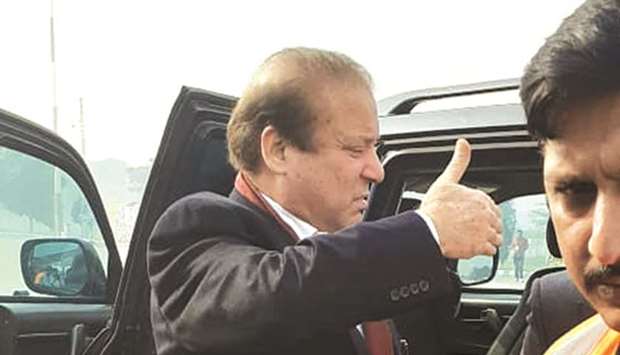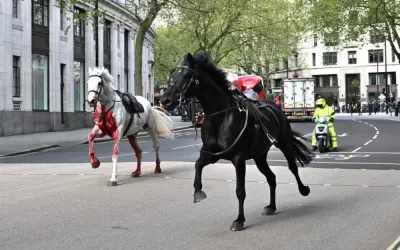Former prime minister Nawaz Sharif left Pakistan yesterday in an air ambulance to seek medical treatment in London, his party said, a month after the three-time premier was released on bail from a seven-year prison sentence for corruption.
Sharif, 69, was accompanied by his younger brother Shehbaz Sharif and personal physician Dr Adnan Khan, leaders of his Pakistan Muslim League – Nawaz (PML-N) said.
Sharif is suffering from an autoimmune blood disorder, has high blood pressure, and his kidney functions are deteriorating, according to aides.
His doctor has said he is “fighting for his life”.
Despite the convictions for corruption, Sharif remains popular among many Pakistanis, and his health has dominated newspaper front pages and TV channels in recent weeks.
Party workers showered rose petals on his car as it left his house on the outskirts of Lahore.
“Thank God that he has left for the medical treatment he needs urgently,” Ahsan Iqbal, a senior PML-N lawmaker, said.
“Nawaz Sharif will go to Boston after going through a detailed check-up in London,” Sharif’s close aide Pervaiz Rashid told Reuters. “During his travel, he will stay in Doha for two hours.”
Until recently, Sharif has consistently said he had no wish to leave the country, preferring to stay and fight for his political survival.
Earlier, PML-N spokesperson Marriyum Aurangzeb said that doctors had conducted a medical test in the morning.
“If Nawaz Sharif had left 15 days earlier, then his treatment would have already started by now,” she said. “Nawaz will be taken to the US for treatment.”
“We will consult the doctors in London and then take a decision,” she said, adding Nawaz was kept on high dose medicine for 15 days.
Aurangzeb further said that in the absence of party supremo Sharif and president Shehbaz Sharif, party affairs will be handled by the senior leadership of the PML-N.
Sharif’s third term as prime minister ran from 2013 to 2017, when he was removed the Supreme Court amid revelations over his personal wealth.
Subsequently convicted of corruption, Sharif has consistently denied the accusations, claiming that they were politically-motivated and blaming the country’s generals for directing the judges to bring him down.
The military denies interfering in politics.
On October 25, Sharif was granted bail and he obtained court clearance to leave the country for medical treatment.
Prime Minister Imran Khan came to power promising an anti-graft campaign and to bring back billions of dollars allegedly squirrelled abroad by corrupt politicians.
Another main opposition leader, Asif Ali Zardari, former president and spouse of the late former prime minister Benazir Bhutto, is also under arrest on corruption charges, which he denies.
Sharif’s daughter Maryam Nawaz, who is his political heir, is also on bail in another alleged corruption inquiry and barred from traveling abroad.
Prime Minister Khan has said that he was ready to let Sharif seek treatment on humanitarian grounds.
However, the court rejected Khan’s demand that Sharif provide an indemnity bond of Rs7bn ($45mn) to ensure that he will return to continue his jail term.
“I hope he comes back, but I don’t expect that he will,” Khan’s cabinet minister Fawad Chaudhry told a news conference.
Court documents seen by Reuters showed Sharif was only allowed to leave for medical treatment after agreeing to a series of conditions preventing him from seeking exile.
Under the court’s terms, Sharif should return in four weeks if his doctors found him fit, and he is required submit medical reports notarised by Pakistan’s embassy in London.
Earlier, immigration sources told Geo News that Sharif’s name will remain on the Exit Control List (ECL) even after the court allowed him to go abroad for medical treatment.
According to immigration officials, since the court granted the former premier an exemption on medical grounds to travel outside the country, he will have to produce the court order to get past immigration officials.
Sources said that the name of the former premier will remain on the ECL as per the law, but his exemption according to the court order will be mentioned in the computerised record.
Sharif has been a central figure in Pakistan’s turbulent politics for three decades.
He served three terms – but did not complete a single one.
His first, beginning in 1990, ended in 1993 when he was sacked for corruption.
The second lasted from 1997 to 1999, when he was deposed by the powerful military.
He was overthrown by a military coup that brought army chief General Pervez Musharraf to power.
Sharif subsequently went into exile in Saudi Arabia, before returning to Pakistan in 2007 as Musharraf’s grip on power began to slip.
Sharif blamed the security establishment for again targeting him in 2017 when the Supreme Court disqualified him from politics for life over graft allegations, which he denies.

Sharif giving a thumbs-up to supporters before boarding the air ambulance.


